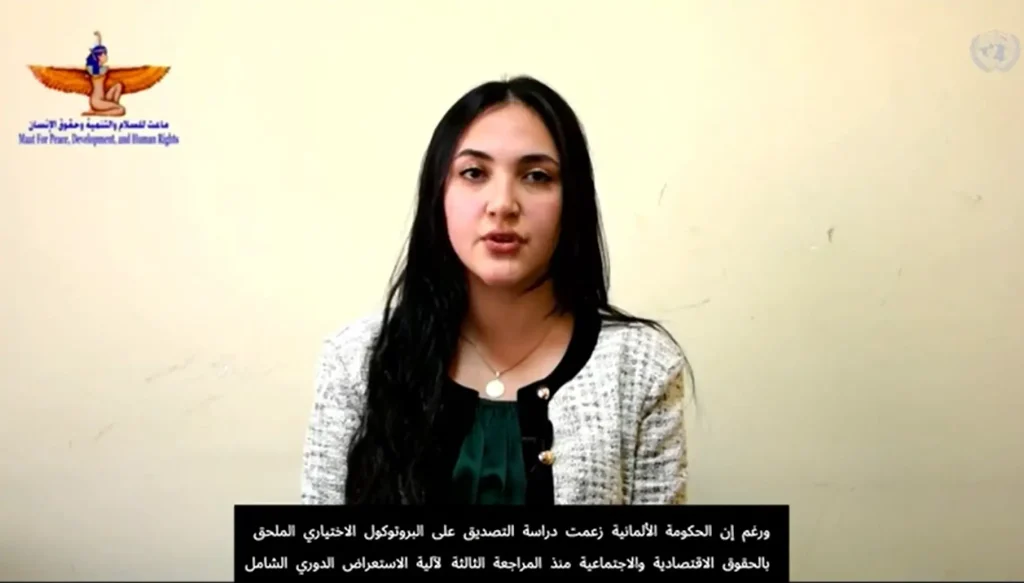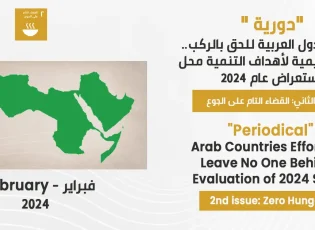At a rally press conference
Maat reaps the harvest of two years of work on the UPR file
Akil: The international system has failed to achieve the desired justice, and there must be a plan to improve the human rights situation in Egypt
Barbet: The European Union is proud to contribute to the review by supporting the Maat Foundation
Othman: The project raised the awareness of 15% of Egyptians about the UPR
Maat Foundation for Peace, Development and Human Rights held a rally under the title “From Geneva to Cairo and vice versa… the harvest of the universal periodic review”, with the participation of a wide range of media professionals, representatives of civil society organizations, diplomats, government officials and other stakeholders and beneficiaries of the project's activities, on Sunday Corresponding to December 24, 2017, at the conclusion of the UPR project as a tool to improve public policies that the Foundation implemented over two years with funding from the European Union.
The conference began with a speech by Professor Ayman Aqil, President of the Maat Foundation, in which he emphasized that the Foundation adopts an approach based on awareness, dialogue, and the presentation of alternatives, and thanked the European Union for its support for this approach in human rights work. Saving humanity from sectarian and sectarian wars, the spread of terrorism, and the major countries ’wasting the rights of other countries. He criticized the politicization of the international human rights system and the subordination of the UN resolution to the domination of political, economic and military influence. Aqeel also called on state agencies to adopt a comprehensive action plan to improve human rights conditions and reform legislation restricting public rights and freedoms. Openness to society is a partner in development, and he concluded his speech by referring to future steps for Maat, focusing on the Foundation’s initiative to establish the International Alliance for Peace and Development, whose membership to date includes 33 organizations from 13 countries at the Arab, African and international levels.
For his part, John Barbet ushered. Head of the Human Rights, Civil Society and Governance Department of the European Union, affirmed that the European Union is proud to participate in fulfilling the recommendations of the UPR by supporting the Maat Foundation, and praised the roadmap that was implemented through the adoption of the constitution and the election of Parliament, noting that the constitution focused on Concerning equality between women and men and the elimination of violence against women, in addition to paying more attention to people with disabilities, pointing to the presence of 89 female parliamentarians for the first time in the history of Egypt, and stressing that these principles must be translated into legislation to ensure that they achieve the social, economic and political goals that were developed from Put it off.
And in his intervention, the deputy stressed. Gamal Al-Sharif, a member of the legislative committee in the Egyptian parliament, and a member of the advisory committee for the project stressed the need for close cooperation between civil society organizations and parliamentarians, stressing the need for legislation and laws to possess the general satisfaction of society. Al-Sharif also stated that Egypt is currently going through the state-building phase and that everyone aspires to a modern civil state, and about the parliament’s role in integrating into society. Al-Sharif mentioned that Parliament has started field visits to governorates that are experiencing challenges in fulfilling various human rights, including, for example, a successful visit in Nuba, Al-Sharif stated that Egypt is suffering from a terrorist attack that calls for the cohesion of the people and the dismissal of differences to reach society for the righteousness of peace.
As the professor did. Fatma Othman, Director of the Universal Periodic Review Project, by presenting the most prominent milestones that the project went through and the most prominent achievements and successes, which began with Maat obtaining a consultative status in the United Nations, which allowed the project to maximize its results through direct engagement with the United Nations system concerned with the universal periodic review Othman revealed that a pilot study conducted by the project indicated that the project had succeeded in increasing the awareness of 15% among the Egyptian people of the UPR.
It is worth noting that the project sought to enhance the role of the international mechanism in improving public policies and reforming human rights in Egypt by actively involving civil society organizations, activists and media professionals in the process and contributing to the adoption of new policies compatible with international human rights standards based on the UPR 2014.
The conference began with a speech by Professor Ayman Aqil, President of the Maat Foundation, in which he emphasized that the Foundation adopts an approach based on awareness, dialogue, and the presentation of alternatives, and thanked the European Union for its support for this approach in human rights work. Saving humanity from sectarian and sectarian wars, the spread of terrorism, and the major countries ’wasting the rights of other countries. He criticized the politicization of the international human rights system and the subordination of the UN resolution to the domination of political, economic and military influence. Aqeel also called on state agencies to adopt a comprehensive action plan to improve human rights conditions and reform legislation restricting public rights and freedoms. Openness to society is a partner in development, and he concluded his speech by referring to future steps for Maat, focusing on the Foundation’s initiative to establish the International Alliance for Peace and Development, whose membership to date includes 33 organizations from 13 countries at the Arab, African and international levels.
For his part, John Barbet ushered. Head of the Human Rights, Civil Society and Governance Department of the European Union, affirmed that the European Union is proud to participate in fulfilling the recommendations of the UPR by supporting the Maat Foundation, and praised the roadmap that was implemented through the adoption of the constitution and the election of Parliament, noting that the constitution focused on Concerning equality between women and men and the elimination of violence against women, in addition to paying more attention to people with disabilities, pointing to the presence of 89 female parliamentarians for the first time in the history of Egypt, and stressing that these principles must be translated into legislation to ensure that they achieve the social, economic and political goals that were developed from Put it off.
And in his intervention, the deputy stressed. Gamal Al-Sharif, a member of the legislative committee in the Egyptian parliament, and a member of the advisory committee for the project stressed the need for close cooperation between civil society organizations and parliamentarians, stressing the need for legislation and laws to possess the general satisfaction of society. Al-Sharif also stated that Egypt is currently going through the state-building phase and that everyone aspires to a modern civil state, and about the parliament’s role in integrating into society. Al-Sharif mentioned that Parliament has started field visits to governorates that are experiencing challenges in fulfilling various human rights, including, for example, a successful visit in Nuba, Al-Sharif stated that Egypt is suffering from a terrorist attack that calls for the cohesion of the people and the dismissal of differences to reach society for the righteousness of peace.
As the professor did. Fatma Othman, Director of the Universal Periodic Review Project, by presenting the most prominent milestones that the project went through and the most prominent achievements and successes, which began with Maat obtaining a consultative status in the United Nations, which allowed the project to maximize its results through direct engagement with the United Nations system concerned with the universal periodic review Othman revealed that a pilot study conducted by the project indicated that the project had succeeded in increasing the awareness of 15% among the Egyptian people of the UPR.
It is worth noting that the project sought to enhance the role of the international mechanism in improving public policies and reforming human rights in Egypt by actively involving civil society organizations, activists and media professionals in the process and contributing to the adoption of new policies compatible with international human rights standards based on the UPR 2014.
You can view the fourth report “Monitoring and following up on the Egyptian government's progress in implementing the 2014 UPR recommendations” at the following link:
https://maatpeace.org/?p=23445











